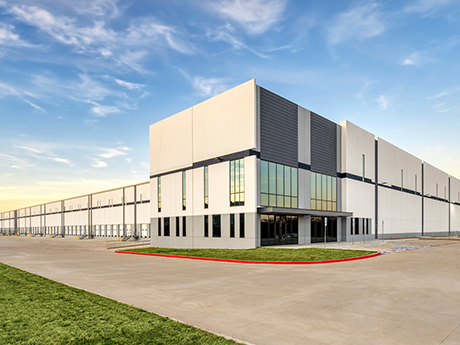By Josh Wheeler, senior vice president of development & acquisitions, Stonemont Financial Group
The Dallas-Fort Worth (DFW) metroplex remains at the forefront of industrial growth in the United States. According to CommercialEdge, the market boasts a pipeline of 15.7 million square feet under construction as of June 2024 after several large deliveries were completed in the first half of the year.
Following several years of explosive growth caused largely by the rise in e-commerce during the pandemic, the market has cooled due to economic headwinds. Tenants are taking longer to make decisions about their spatial needs. Construction has slowed after almost 18 million square feet of space was delivered in the first half of the year, including Stonemont’s 565,000-square-foot industrial park in Wilmer, just outside the metro area.

As a result, vacancy rose to 11 percent in the third quarter of 2024. The market has continued its 14-year-long trend of positive absorption, though 2024’s year-to-date absorption is 6.5 million square feet below last year’s number.
However, there is ample reason to remain bullish on DFW and to view the market as well-positioned to maintain its status as one of the country’s leading industrial powerhouses. Trends remain favorable for the market, buoyed by increased investment in manufacturing, population growth and heightened demand for industrial storage facilities (ISFs), also known as industrial outdoor storage (IOS). There is a pressing need for quality, well-positioned industrial product in the DFW metroplex.
All of this to say that our market is stabilizing after years of unprecedented growth and demand, and we are moving back to what can be considered “pre-COVID”, normalized data.
As we approach 2025, there are several opportunities — and potential challenges — for DFW’s industrial sector that are worth monitoring.
Manufacturing Growth in Mexico, Cross-Border Trade
One of the primary forces behind the surge in industrial development in DFW is the rise in manufacturing activity in northern Mexico.
Notably, 66 percent of all United States-Mexico trade traffic passes through Texas, making the state a gateway for cross-border trade and a central point within our country’s supply chain network. This trend is contributing to increased demand for industrial space in border markets such as El Paso and Laredo, which has had a ripple effect on DFW and has led to an increased need for warehouse supply to keep up with surging demand.
DFW has the fundamentals to support this influx of supply from Mexico, particularly its strong labor force and centralized location, making it an ideal industrial hub for companies to efficiently reach any part of the country. This dynamic ensures Texas remains a critical beneficiary of increased manufacturing and trade with Mexico and will keep demand strong within the metroplex so long as this activity in northern Mexico remains robust.
Industrial Service Facilities in High Demand
As DFW grows across various sectors, there is demand for space to hold all of users’ equipment, materials and transportation vehicles.
As such, ISFs are seeing increased demand due to the sustained growth in the industrial sector, and significant capital is being deployed in DFW for these types of facilities. As mentioned above, the market’s centralized location has made it a key player in the supply chain for the greater country, and the need for storage space along the path to meet consumers will be a consistent need.
As companies look to expand their operations and infrastructure in Texas, ISFs are set to play a vital role in supporting this growth. We expect to see more investment in this sector, particularly in areas of DFW in which land availability is tighter, as the market continues to grow and healthy demand pushes forward.
Power Supply Challenges
The industrial landscape across the country is shifting as more emphasis is placed on manufacturing users, alongside the traditional presence of third-party logistics (3PL) providers.
While there are many economic benefits to this surge in manufacturing growth, it is bringing attention to a longstanding issue: the need for reliable power. Developers are facing a significant challenge in securing the necessary power to support new manufacturing facilities, which often require more energy than typical logistics operations. Data centers are also growing exponentially across DFW, which is diminishing the already scarce power supply.
For speculative projects in which tenant needs are unknown, power suppliers often limit the initial energy supply. This creates a timing issue, as developers cannot guarantee that a building will be fully powered on Day 1, potentially delaying occupancy.
On the other hand, build-to-suit (BTS) projects, where developers know specific power requirements in advance, face fewer hurdles. As developers, tenants and power suppliers navigate this, the need for accessible and scalable power solutions will be a critical topic in the future.
A Dominant Future for DFW
These predictions are not isolated to one specific area of the market. At Stonemont Financial Group, we are seeing a surge of development in the Denton area and would consider this submarket to be a next frontier for industrial growth in the region. We’re also seeing developers and investors push further into West Fort Worth and East Dallas, expanding on the periphery of the overall market. These areas will certainly be on industry leaders’ radars into the next year.
DFW remains a vital player in the U.S. industrial landscape. With its strategic location, robust infrastructure and continued investment, the region is well-positioned for sustained growth, even as market dynamics evolve. Developers are preparing to meet the demands of a growing industrial base, with a keen focus on addressing challenges like power availability and capitalizing on new opportunities in the ISF space. DFW’s industrial market is healthy, and will continue to top the U.S. charts for industry growth well into 2025.
Josh Wheeler is a Dallas-based senior vice president of development and acquisitions at Stonemont Financial Group, a private real estate investment firm specializing in industrial investments.


